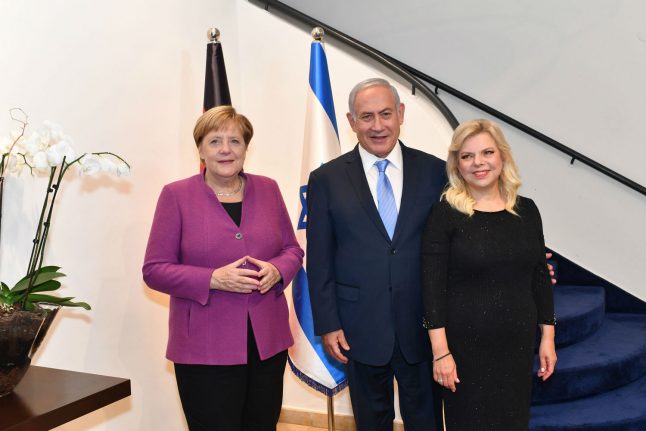The visit by Merkel and members of her cabinet comes as part of German-Israeli government consultations held regularly, though the last one in 2017 was postponed, with scheduling conflicts cited as the official reason.
There were reports however that Merkel was unhappy with a law passed then related to Israeli settlement building in the occupied West Bank.
There has been no shortage of controversy ahead of this week's visit.
Last week at the UN General Assembly, Netanyahu accused Europe of “appeasement” of Iran, a word evoking European capitals' reluctance to stand up to Adolf Hitler in the run-up to World War II.
Netanyahu has been seeking to convince European countries to follow US President Donald Trump's lead and withdraw from the Iran nuclear deal.
Germany, like the other signatories to the hard-fought deal, has sought to keep it alive, saying it is preventing Iran from obtaining nuclear weapons for now.Netanyahu has also hit out at what he calls the EU's “absolutely crazy” demands of Israel, such as those related to his country's occupation of
Palestinian territory.
As a counterweight, he has sought sympathetic ears within the EU among countries whose leaders' nationalist stances have been a thorn in Brussels' side, including Hungary.
Despite those issues and others, both sides seem determined to have the visit run smoothly.
Germany says the discussions will focus on economic ties, innovation and technology, while noting that the government-to-government consultations have been in place for 10 years.
It mentions Merkel's previous comments on the responsibility toward Israel that Germany bears as the perpetrator of the Holocaust.
Felix Klein, who heads the German government's fight against anti-Semitism, will be part of the delegation. Fears of a resurgence in anti-Semitism in Germany are expected to be discussed.
SEE ALSO: Are refugees to blame for a rise in anti-Semitism…or are they being scapegoated?
“Germany and Israel are linked by a unique relationship,” Merkel said in her weekly podcast.
“And we are grateful that we are now close partners and friends.”
There will be no meetings with Palestinian officials during the one-day visit.
'She's lost hope'
EU nations have repeatedly criticized Israeli settlement building and warned over threats to remaining prospects for a two-state solution to the Israeli-Palestinian conflict.
Germany has remained steadfast on the issue. In recent weeks, it has joined calls against Israel's planned demolition of a Bedouin village located in a strategic area of the occupied West Bank.
On Tuesday, residents of the village, Khan al-Ahmar, displayed signs with Merkel's picture calling for help.
Yoram Ben-Zeev, a former Israeli ambassador to Germany, said Merkel would likely only “go through the motions” during the visit on issues related to the conflict with the Palestinians.
“I think that for the time being she's lost hope that things can move,” Ben-Zeev told AFP, noting Trump's confusing statements on the conflict, Netanyahu's right-wing stance and Palestinian president Mahmud Abbas's unpopularity.
“Why should she put her hands in the fire?”
Netanyahu will likely want to speak about his country's main enemy Iran while possibly requesting Merkel's assistance in dealing with Russian President Vladimir Putin, said Ben-Zeev.
Russia has been angered by the recent accidental downing of one of its planes by Syrian air defences during an Israeli raid in Syria.
It has delivered the advanced S-300 air defence system to Syria as part of its response, which could limit Israel's strikes against Iranian and Hezbollah targets there.
A visit to Israel by Germany's then-foreign minister Sigmar Gabriel in 2017 ended in acrimony when Netanyahu cancelled their meeting.
Netanyahu made the decision after Gabriel refused to call off meetings with rights groups critical of Israel's government.
When Gabriel visited again in January, the two met but Netanyahu publicly corrected him over his stance on a two-state solution.
Gabriel had said he was “very thankful to hear that, of course, also the government of Israel wants to have two states” with secure Israeli borders.
Netanyahu interjected to reiterate his position that Israel must maintain security control in the Palestinian territories under any peace arrangement. He declined to say whether that would mean Palestinian statehood or some lesser form of autonomy.




 Please whitelist us to continue reading.
Please whitelist us to continue reading.
Member comments